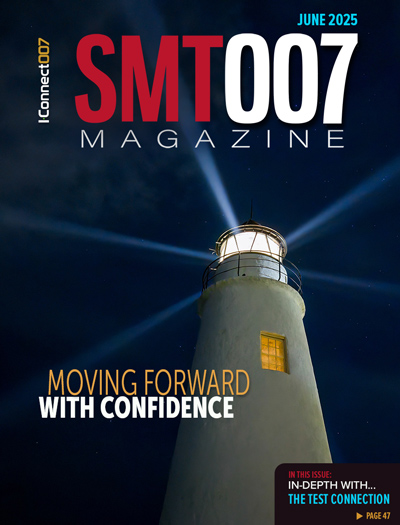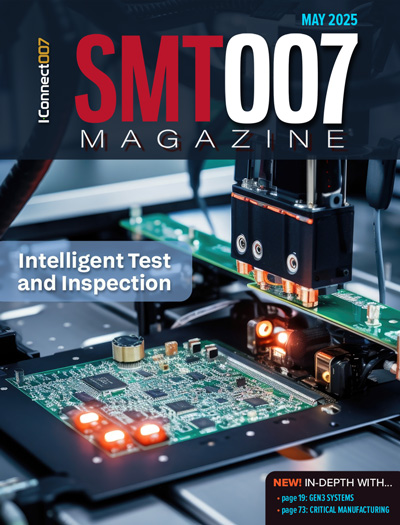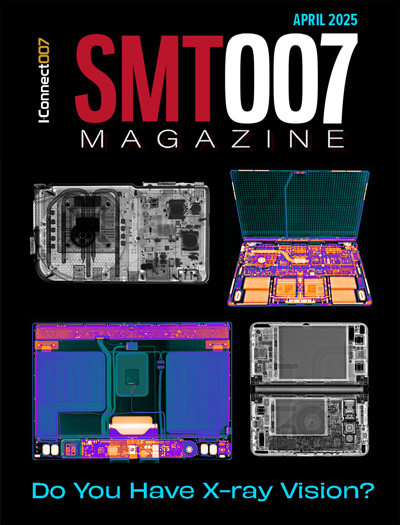-

- News
- Books
Featured Books
- smt007 Magazine
Latest Issues
Current Issue
Moving Forward With Confidence
In this issue, we focus on sales and quoting, workforce training, new IPC leadership in the U.S. and Canada, the effects of tariffs, CFX standards, and much more—all designed to provide perspective as you move through the cloud bank of today's shifting economic market.

Intelligent Test and Inspection
Are you ready to explore the cutting-edge advancements shaping the electronics manufacturing industry? The May 2025 issue of SMT007 Magazine is packed with insights, innovations, and expert perspectives that you won’t want to miss.

Do You Have X-ray Vision?
Has X-ray’s time finally come in electronics manufacturing? Join us in this issue of SMT007 Magazine, where we answer this question and others to bring more efficiency to your bottom line.
- Articles
- Columns
Search Console
- Links
- Media kit
||| MENU - smt007 Magazine
NextFlex Names Dr. Gamota as Incoming Executive Director
August 15, 2024 | NextFlexEstimated reading time: 3 minutes
NextFlex, America’s Hybrid Electronics Manufacturing Innovation Institute focused on additive microelectronics manufacturing for novel applications and complex integrated systems, announced the appointment of Dr. Daniel Gamota, a well-known and experienced manufacturing and technology executive, to lead NextFlex into its next chapter as Executive Director, effective September 1, 2024. Dr. Gamota succeeds Dr. Malcolm Thompson, the inaugural Executive Director of NextFlex.
NextFlex leads a consortium of companies, academic institutions, non-profits, state and local governments, and federal government agencies that collaborate to advance the technology, manufacturing, and commercialization of hybrid electronics, to establish a sustainable domestic manufacturing ecosystem in support of the technology, and to accelerate the growth of the current and future manufacturing workforce. Established in 2015 in San Jose, CA, NextFlex is a public-private partnership supported by the U.S. Department of Defense under a Cooperative Agreement with Air Force Research Laboratory (AFRL) and is part of the Manufacturing USA® network.
“On behalf of NextFlex, I’m delighted to announce Dr. Gamota’s appointment to lead the NextFlex Manufacturing Innovation Institute into its next phase. Having been an active and long-standing member of NextFlex through his role at Jabil, Dr. Gamota consistently demonstrates his strategic support for the mission of the Institute and its members and partners,” said Dr. Robert Smith, Boeing Executive Technical Fellow, and Chair of the NextFlex Governing Council. “Hybrid electronics technology is at a critical inflection point – as it increasingly is integrated into volume manufacturing for both commercial and defense applications, it’s more important than ever that NextFlex continues to align the manufacturing ecosystem and accelerate the growth of the workforce of tomorrow.”
Dr. Gamota has more than 25 years of experience leading large organizations such as Jabil, where he served as Vice President, and Motorola, where he served as Director & Fellow of the Technical Staff, both of which industrialized innovative products and deployed advanced microelectronics manufacturing operations to international high volume production sites. He is recognized for leading R&D and collaborative innovation teams spanning Semiconductor Foundry (middle end of line and backend of the line), Semiconductor Assembly, Packaging & Test, Complex Integrated Systems Assembly, and Printed Circuit Board Assembly operations. Dr. Gamota is a proven P&L leader of global engineering, operations, and business teams that developed, deployed, and sustained microelectronics-based product manufacturing that resulted in revenue growth, expanded margins, and increased free cash flow.
Dr. Gamota has a strong record being awarded and leading several multi-member microelectronics systems solutions development programs (DARPA, NIST ATP, etc.). He is a member of the SEMI Board of Industry Leaders, University of Michigan MSE External Advisory Board, and San Jose State University Engineering Industry Advisory Council, providing strategic technology, market, and workforce development guidance. Also, Dr. Gamota is active in and has chaired committees developing microelectronics guidelines, standards, and roadmaps for IEEE, iNEMI, IPC, IEC, A*STAR, and SEMI.
Dr. Gamota was elevated to a NextFlex Fellow, IEEE Fellow, and was named a Dan Noble Fellow at Motorola for his contributions and leadership in microelectronics design, materials, packaging, processes, manufacturing, assembly, and testing. He earned a Ph.D. in engineering from the University of Michigan and a Master of Business Administration from the Kellogg School of Management at Northwestern University.
“I am excited to lead NextFlex as it evolves to become an engine for product industrialization and commercialization of a portfolio of innovations, a pipeline for talented workforce, and a strategic partner to volume manufacturing services providers and OEMs. NextFlex has the foundational tenets - talent, funding, programs, operational structure, and facility - to ensure it continues to be globally recognized as the nexus for Hybrid Electronics innovation,” said Dr. Gamota. “I believe that NextFlex must continue to demonstrate agility in navigating the multidimensional complexities impacting the Electronics Manufacturing Ecosystem: workforce, supply chain resiliency, sustainability, and technology innovation. I also look forward to leading the NextFlex community as it continues to foster strong collaboration with Ecosystem members that represent diverse industry, academic, and government groups driving key enabling R&D topics.”
Dr. Gamota’s appointment marks the beginning of NextFlex’s tenth year of operations. During this time, NextFlex has grown its membership to more than 210 organizations, managed over $400M in 240 technology and manufacturing development projects, served more than 25,000 students around the country with its education and workforce development programs, established three regional U.S. nodes in Massachusetts, Missouri, and New York, outfitted an end-to-end pilot scale design, prototype and manufacturing facility in Silicon Valley, and produced annual technology and manufacturing roadmaps to guide and de-risk investment for the member community.
Suggested Items
Kitron Wins Additional €7 Million Contract, Expanding Presence in Industrial Automation
06/06/2025 | KitronKitron has signed a significant manufacturing agreement with a leading customer in the industrial automation sector. The agreement covers electronics manufacturing services for a new generation of high-performance drive modules used in automation and motion control systems.
I-Connect007 Editor’s Choice: Five Must-Reads for the Week
06/06/2025 | Nolan Johnson, I-Connect007Maybe you’ve noticed that I’ve been taking to social media lately to about my five must-reads of the week. It’s just another way we’re sharing our curated content with you. I pay special attention to what’s happening in our industry, and I can help you know what’s most important to read about each week. Follow me (and I-Connect007) on LinkedIn to see these and other updates.
New Companion Guide to ‘DFM Essentials’ Delivers Deeper, Practical PCB Design Insights
06/05/2025 | I-Connect007The Companion Guide to DFM Essentials: Tips for Designing for Manufacturing is now available for free download. Building on the popular Printed Circuit Designer’s Guide to... DFM Essentials, this new resource from American Standard Circuits and ASC Sunstone Circuits offers advanced, real-world guidance to help PCB designers streamline production and avoid costly pitfalls.
Orbel Corporation Integrates Schmoll Direct Imaging
06/04/2025 | Schmoll AmericaOrbel Corporation in Easton, PA, proudly becomes the first PCM facility in the U.S. equipped with Schmoll’s MDI Direct Imaging system. This installation empowers Orbel to support customers with greater precision and quality.
GlobalFoundries Announces $16B U.S. Investment to Reshore Essential Chip Manufacturing and Accelerate AI Growth
06/04/2025 | GlobalFoundriesGlobalFoundries, working with the Trump Administration and with support from leading technology companies aiming to onshore critical components of their supply chain, announced plans to invest $16 billion to expand its semiconductor manufacturing and advanced packaging capabilities across its facilities in New York and Vermont.


